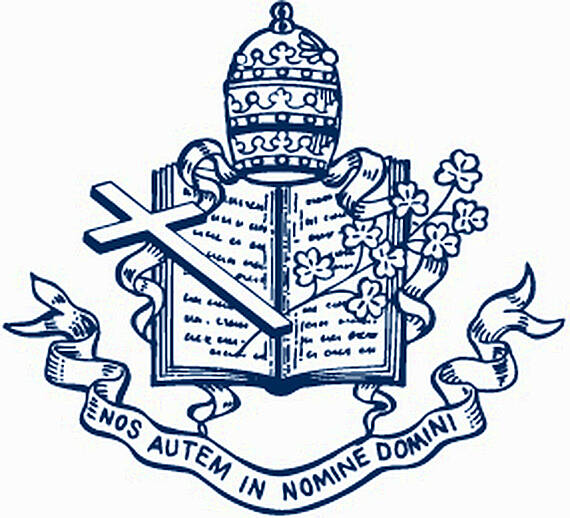Patrick O’Donoghue, class '44
1926 - 2002

-
A schoolboy arriving in Castleknock in the autumn of 1952 could not be expected to realise that it was also a significant, not to say momentous, time for one of the priests on the staff. Paddy O’Donoghue, ordained the previous May, was beginning his first appointment as a Vin. A career began that September which would leave its mark - a uniformly good mark - on hundreds of boys whose hopeful parents had decided to send their sons to Castleknock. Paddy would (if pressed) admit that by the position of dean, which he took up the following year, he was vested with the role of father to all his young charges in the strictly enclosed setting of a nineteen-fifties boarding school. In that role he was much appreciated by many men who saw that being the significant authority figure to their own teenaged boys was not completely within their powers. Paddy knew, to use his own words, that authority was not something you could turn on like a tap, but was based on respect that had to be earned. He earned it.
In my day, the dean hardly ever taught class, unless a regular teacher was absent for a few days. Paddy tried teaching us Irish once, and felt the devilment of schoolboys with a teacher out of his subject. But he deflected the probes and neither deflated the youngsters nor did his own standing any harm. Outside class though, when he would sometimes talk about the things he knew very well, such as the turbulent Irish political scene of the twenties and thirties, his value as a teacher flashed through. It could strike you that you were missing something through having him only as a dean, though of course the school was well supplied with talented history teachers. Paddy came into his own as a teacher in his second career, from 1972 to 1999, when he was a lecturer at St Patrick’s College, Drumcondra.
In his early time in ‘Knock, however, his leadership skills were given their fullest scope on the rugby pitch, at a later stage than ours. It is the measure of the man that he could forge a cup-winning team out of the small pool of some 120 senior boys. As a trainer he won passionate loyalty from his players. A good many, not only of them but also of the athletically more challenged, went on in business and the professions to prove themselves leaders and managers in his mould.
When he became President of Castleknock, in 1963, Paddy was confronted with the enormous financial challenge of developing a not very large school run by a not very wealthy congregation. For someone so highly respected within the college to take the road as a fund-raiser was a major change. It opened eyes we thought were already wide open to a new side of life. As he put it, “The ones who have won’t give it, and that’s why they have it. And the ones who haven’t want to give, and that’s why they haven’t it.” But he never forgot the generous givers, however impecunious, and they were prominent among the vast numbers of people whose passing he marked by attending their funerals, or at least writing a letter to say just the right words.
Paddy was of course a perfectionist. As such he was at risk from the perfectionist’s anger when it turns against himself. In the middle years of his priesthood, he had to engage in his greatest authority-struggle, that of self-mastery. Success in this was not immediate, as perhaps it had been earlier in his life. But it came, and he found himself cast in a new kind of leadership role among men and women who needed to win that same fight themselves. It would never occur to anyone to compare Paddy O’Donoghue with Matt Talbot, but he became just the kind of person a Matt Talbot needed to meet.
Paddy’s faith was the bedrock of his life. He shared his Gaelic forebears’ reverence for the priesthood. At an early stage in my class’s dealings with him he banned us from imitating the priests in stage skits. “The office is too sacred” - yes, he said that. Surely Paddy must in time have relaxed his hard line on juvenile theatricals. What remained was a commitment to the daily offering of Mass in what was for him a very warm and devotional way. His Mass expressed his deepest personal conviction as much as anything he said or did. Paddy’s last act before he died was to hear the Sunday Mass at Rickard House.
Did he die happy? Not in the bright glow of success – so much of what he strove to build up had begun to crumble. But he certainly attained the level of faith, and hope, and charity that enabled him to hand over the unappetising present and the unforeseeable future to the Lord, in whom his trust was absolute. In that respect, he never ceased to be a father to all those who knew him, a source of good-humoured peace. I líontaibh Dé go gcastar sinn go léir.
Myles Rearden CM
PATRICK O’DONOGHUE CM
Born: Limerick, August 31 1926
Entered the CM: September 7 1944
Final vows: September 8 1946
Ordained: May 25 1952 in Holy Cross College, Clonliffe, by Dr John Charles McQuaid, Archbishop of Dublin.
APPOINTMENTS:
1952-’72 St. Vincent’s College, Castleknock
1972-’99 St. Patrick’s College, Drumcondra
1999-2002 St. Vincent’s College, Castleknock
Died: August 18 2002
Buried: St. Vincent’s, Castleknock
